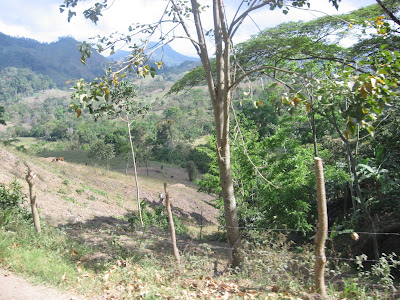
Jose Angel and Erick leading the workshop

Sorting clothes

Me playing Twister

Youth working together

Melissa and Grismaylin carrying supplies

Waslala's natural beauty
Semana Santa, or Holy Week, is a glamorous affair for many in Nicaragua. Attending religious services seemingly takes a backseat to trips to the beach, time with friends, and lots of partying. While many of us in the U.S. (me included) may consider this a week of religious reflection, for many Nicaraguans the hottest time of the year plus universal vacation time equals heading out of the city for some rest and relaxation.
The Youth Group I work with headed out of Managua along with everyone else, but for a slightly different reason. We spent four days in Waslala, a rural area northeast of Managua devastatingly affected by the Contra War in the 1980’s. Because of its distance from Managua, the region is neglected by the government and has limited access to resources. However, it is also an absolutely beautiful part of the country and is actually a protected nature reserve. Within this brief sketch of Waslala you can see the many contradictions and the ways in which life in this region is difficult for its inhabitants.
This was the Youth Group’s second annual visit, and our objectives were to share with the community of Waslala by delivering clothing and school supply donations, leading a self-esteem workshop with children, and learning from the youth and communities about their organizations.
Our time in Waslala was filled with experiential learning:
•What do you do when you’ve run out of food to feed over 100 people who have come to share with you?
•How do you make sure one activity runs smoothly while the next activity is being prepared?
•How do you divide up tasks as a team, making sure everyone feels included AND is doing their share?
•How do you keep a group of 50 children entertained and learning about self-esteem when they range in age from 2 to 12?
•How do you balance learning from the community you’re visiting and sharing your own passions and skills with them?
These are just a few of the tough issues we confronted and learned from as a group. Obviously, there is endless potential for leadership development and teamwork in this experience. The Youth Group did an excellent job responding to these issues, organizing themselves, and learning from one day to the next how to make their events run more smoothly. We also experienced profound sharing with the youth in Waslala who accompanied us every step of the way.
One insight from a group member that particularly struck me was: “These communities don’t need our help. We need to come here and learn from them how to better-organize ourselves.” Exactly.

.jpg)






